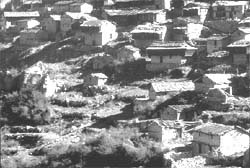Twice Unlucky
 the Bhotiya villages of Lata, Reni, Jumma and Dunagiri wear a deserted look. Many houses are vacant. Most of the houses that are inhabited are managed by women as the men have migrated to neighbouring towns to earn a living.
the Bhotiya villages of Lata, Reni, Jumma and Dunagiri wear a deserted look. Many houses are vacant. Most of the houses that are inhabited are managed by women as the men have migrated to neighbouring towns to earn a living.
Migration and change is nothing new for these people. In 1962, the Indo-Chinese war forced them to migrate because the trade between India and Tibet was banned after the war. Now it is the Man and Biosphere (mab) programme of the government of India which threatens their livelihood and link with the area they inhabit. The creation of the Nanda Devi Biosphere Reserve (ndbr) under the mab programme has led to the forest department imposing a blanket ban on access to the Nanda Devi sanctuary, which is in the core zone of the ndbr.
The Bhotiyas live in the Garhwal and Kumaon divisions of the Uttar Pradesh hills and have traditionally been an important link in the trade across the Indo-Tibet border. They have been both trade parties (in the predominantly barter trade) and transporters of goods. Sheep and goats were the major carriers of goods across the tough terrain and so Bhotiyas, who kept large flocks, were also graziers by occupation.
Deprived of the cross-border trade after the war, they took to tourism whole-heartedly, which boomed after the improvement of the road network to the Nanda Devi sanctuary. The Bhotiyas made good in their new occupation. In summer months, it became the most important source of income for the menfolk. The men accompanied expedition groups, while they camped inside the sanctuary, sometimes for as long as two months. For the Bhotiyas, the treacherous route meant jobs as porters to carry supplies.
"I used to earn Rs 150 a day, at times even Rs 300. It was easy to pay for my children's education and run the household,' says Bachan Singh, who was a shepherd before becoming a porter. "Ever since the ban on access to the sanctuary, it has become difficult to carry on because there are no tourists,' he says.
With the formation of the ndbr, the Bhotiyas find themselves compelled to look beyond their traditional habitat for survival. The stress is visible but this time there is no war and they have decided to stand their ground and not let themselves be manipulated by the government. These people, who once sparked off the famous
